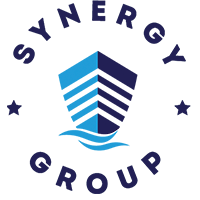1. Why did you choose a career in the Navy, and why did you leave?
I have a forces background as my father served a full term in the Indian Air Force. I had wanted to join the armed forces since my childhood days and always had a fascination for the uniform, and candidly that is why I chose the Navy. I did that on a short service commission, which meant that I retired after 14 years.
2. Where did you complete your training?
My initial Navy training was for 18 months, as follows:

| Training | Duration | Location |
| Orientation (physical and psychological military training) | 6 months | Ezhimala, Kerala |
| Professional Air Traffic Control course | 6 months | Air Force Academy, Hyderabad |
| Naval sub-courses | 6 months | Various, involving logistics, firefighting, Nuclear, Biological and Chemical Defence, basic ship training and leadership |
There were also in-service progression courses from time to time.
3. Why did you want to join the Synergy Marine Group?
Just before leaving the Navy, I was looking for opportunities that offered similar challenges and intricacies to my role as an Air Traffic Control Officer. The role of Manager-Digital Desk with Synergy offered similar prospects, the only real difference being dealing with ships rather than aircraft. According to the challenge that I have set myself, I hope and think that I can be a change enabler and, as appropriate, bring to the very different world of ship management some of the best practices in aviation and defence.
4. Please describe a typical day in your present role.
This involves coordinating, managing and leading a diverse group of marine, technical and data executives, with whom I need to be in sync at all times in order to marshal all activities efficiently.
My typical day starts with going through emails and updating myself, followed by a team meeting (standing, to make it as efficient as possible) to check progress and decide the day’s agenda, and then a learning and development session on a topic of common interest – and especially on new technology and its application – and then probably some planned meetings with, or presentations to, members of the managed fleet. At the moment, too, we have frequent brainstorming sessions with Alpha Ori and other stakeholders, to further improve the SMARTShip IoT platform.
5. What do you enjoy most about using technology?
I enjoy the dynamism of it. Technology is a field where obsolescence is fast i.e. a system that you have been using for more than five years can be replaced with a more intelligent one in just a month. No one can boast about knowing everything, and the more you explore the more you get. So the best part about technology is that every day is a new learning experience, and keeping abreast of the latest trends, continuous improvement and not being stagnant are the things I like most.
6. How could organisations improve career-related IT access for women and girls?
This can be done in two ways.
First, by identifying talent early and nurturing it with in-house on-the-job training. For example, India’s National Defence Academy has started inducting girl cadets into technology roles, after they have completed their first year, and they can later specialise in different branches. As well as, for many newcomers, reducing financial dependency on family, this would create value for the company near the very outset of a young girl’s career. Second, there could be purposive lateral absorption from various other sectors where women are already trained in and working on suitable technology.
7. During your career, have you faced any particular challenges just because you are a woman?
I think that, still, every young woman who goes out to work has to tackle challenges on the domestic front, and so did I. However, if like me your close family is supportive and encouraging, you can pursue the career you have dreamt of.
Also, though the Navy was great and provided equal opportunities, so that I could stand level with men, the inevitable frequent transfers and changes of working environment and boss meant that I often had to prove myself all over again and show that I could equally well adjust, adapt and grow in a new role.
And that sometimes meant it was necessary to go further than a male counterpart, and in some places that probably still applies.
8. Female seafarers are still comparatively scarce, but things are changing for the better. Do you agree?
Yes, female participation in this sector is certainly improving. However, women are still at less than 2% among seafarers, compared to other roles, such as aviators, where it is around 12%, so there is still some considerable way to go. However, many initiatives by Synergy and other maritime stakeholders are giving special focus to this particular aspect of diversity, and certainly such policies will bring about further change.
9. What are the advantages in having women on board ship?
Generally, it provides a good mix in the workforce, and probably a better environment results – and one that more nearly reflects everyday life on shore. Also, it may provide different perspectives on many aspects of welfare, and thus better inform decision-making.
10. What further changes do you think the maritime industry needs to make to improve gender equality and attract more women to a career?
These things will take time to improve, and in my own view a progressive, rather than a sudden and radical, approach is needed. I feel though that, if not already, the industry could start to offer more executive positions to women seafarers. I am not urging any kind of positive discrimination, but it would be good if thought could be given to this so that no valid opportunity is missed, as such would definitely help instil confidence in the lower ranks and among women who have recently joined.
11. What are your aspirations, and where do you see yourself in five years?
I aspire to build an efficient and self-motivated team in Synergy’s Remote Operations Optimisation Centre (ROOC) and help develop more of those, worldwide, in order better to support seafarers and to lessen maritime incidents. I would like to be a key contributor to all vessels moving up a further notch i.e. from preventive to predictive maintenance.
12. What do you do when you are off duty?
When not working I love to spend time with my family and kids, to pursue my hobbies like playing badminton, swimming, travelling and listening to music, and generally to keep a good balance of physical and mental health.
13. What do you think you will miss most about the Navy?
It is inevitable that I will miss the pride that I used to take in wearing the uniform, the discipline of the military environment, the camaraderie and of course the thrill of air traffic control.
14. Share something interesting about yourself that we might not know.
Flying a Cessna aircraft is the most thrilling experience I had during my college days in the National Cadet Corps. I have around two hours’ flying experience, but I could not do more as I had to give priority to college and NCC demands.
15. Tell us about your drivers/inspiration to keep on doing what you have been doing.
What keeps me going is my desire for continuous learning, allied to great encouragement from my parents, my husband and my friends and their faith in my potential.
16. What advice would you give to anyone considering a career in the maritime industry, and especially to women and girls?
To all women and girls who want a maritime career, I would suggest that they should always be ready to try something different, as there are very many roles and opportunities waiting to be explored in this sector. However, everyone should also be physically and mentally ready to take responsibility, to lead by example and to face challenges, as it is a demanding profession.



